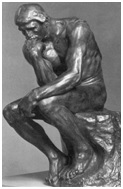|
 |
|
 |
|
|
||
Voltaire - Philosophy, Success and Ethics
Voltaire (1694-1778)
French writer (pictured right) and philosopher whose thinking had a big influence on the American and French Revolutions.
His most famous book is... Candide (1759) This novel savagely attacked Gottfried Leibniz (pictured right), the German philosopher and mathematician, for saying that God created the “best of all possible worlds”.
What did he say about success and ethics?
1. Learn and improve your knowledge How?
2. Influence people How?
3. Be happy How?
Voltaire also said that happiness is good for your health!
4. Importance of work Work saves you from three great evils:
5. Do good You must have the freedom to
“How infinitesimal is the importance of anything I do, but how infinitely important is that I should do it”, he said. 6. Beware of war and patriotism War is legalized murder, and patriotism is dangerous. “To wish greatness for one’s country is to wish harm to one’s neighbours”, he said.
7. Freedom of thought and expression Challenge every fact and all authority to discover if powerful people are telling the truth. Every person has the right to hold and express any opinion so long as it doesn’t cause violence or unrest. So he attacked the Roman Catholic Church for telling people what to think (but see point 8) People seek religion because dogmatic certainty is more appealing than intellectual doubt. 8. Don't forget God Despite his criticism of the Catholic Church (see point 7), he still believed in God. “If God did not exist, it would be necessary to invent him”, he said.
9. “The perfect is the enemy of the good” This famous quote of Voltaire’s explains how perfectionism:
So:
10. Philosophy should be useful Philosophy must be clear and relevant to ordinary people, so that it can improve their lives. Philosophy is the best way to defeat superstition and prejudice. “Superstition sets the whole world in flames, philosophy quenches them”, he said.
Key quotes on God and religion If God did not exist, it would be necessary to invent him. God is on the side not of the heavy battalions, but of the best shots
Key quotes on learning and wisdom Love truth but pardon error. Superstition sets the whole world in flames, philosophy quenches them.
Key quotes on ethics Every man is guilty of all the good he did not do. Under coercion there is no virtue. The perfect is the enemy of the good.
Key quote on influencing people Those who can make you believe absurdities can make you commit atrocities.
Key quotes on communication I disapprove of what you say but I will defend to the death your right to say it.
Key quote on management It is a vice to trust all and equally a vice to trust none.
Key quote on motivation What makes people unhappy is being made to do things against their will.
Key quote on empowerment and freedom Liberty is power.
|
|
|
||
|
|
||
| Copyright © wisdomtowin.com 2025 All Rights Reserved | ||
|













